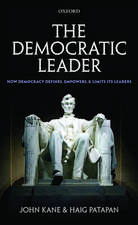Radicals, Reformers, and Reactionaries: The Prisoner's Dilemma and the Collapse of Democracy in Latin America
Autor Youssef Cohenen Limba Engleză Paperback – 31 iul 1994
Latin American democracies of the sixties and seventies, most theories hold, collapsed because they had become incompatible with the structural requirements of capitalist development. In this groundbreaking application of game theory to political phenomena, Youssef Cohen argues that structural conditions in Latin American countries did not necessarily preclude the implementation of social and economic reforms within a democratic framework.
Focusing on the experiences of Chile and Brazil, Cohen argues that what thwarted democratic reforms in Latin America was a classic case of prisoner's dilemma. Moderates on the left and the right knew the benefits of coming to a mutual agreement on socio-economic reforms. Yet each feared that, if it cooperated, the other side could gain by colluding with the radicals. Unwilling to take this risk, moderate groups in both countries splintered and joined the extremists. The resulting disorder opened the way for military control.
Cohen further argues that, in general, structural explanations of political phenomena are inherently flawed; they incorrectly assume that beliefs, preferences, and actions are caused by social, political, and economic structures. One cannot explain political outcomes, Cohen argues, without treating beliefs and preferences as partly independent from structures, and as having a causal force in their own right.
Focusing on the experiences of Chile and Brazil, Cohen argues that what thwarted democratic reforms in Latin America was a classic case of prisoner's dilemma. Moderates on the left and the right knew the benefits of coming to a mutual agreement on socio-economic reforms. Yet each feared that, if it cooperated, the other side could gain by colluding with the radicals. Unwilling to take this risk, moderate groups in both countries splintered and joined the extremists. The resulting disorder opened the way for military control.
Cohen further argues that, in general, structural explanations of political phenomena are inherently flawed; they incorrectly assume that beliefs, preferences, and actions are caused by social, political, and economic structures. One cannot explain political outcomes, Cohen argues, without treating beliefs and preferences as partly independent from structures, and as having a causal force in their own right.
Preț: 261.07 lei
Nou
Puncte Express: 392
Preț estimativ în valută:
49.97€ • 54.30$ • 42.00£
49.97€ • 54.30$ • 42.00£
Carte tipărită la comandă
Livrare economică 21 aprilie-05 mai
Preluare comenzi: 021 569.72.76
Specificații
ISBN-13: 9780226112725
ISBN-10: 0226112721
Pagini: 196
Dimensiuni: 140 x 216 x 15 mm
Greutate: 0.24 kg
Ediția:1
Editura: University of Chicago Press
Colecția University of Chicago Press
ISBN-10: 0226112721
Pagini: 196
Dimensiuni: 140 x 216 x 15 mm
Greutate: 0.24 kg
Ediția:1
Editura: University of Chicago Press
Colecția University of Chicago Press
Cuprins
List of Figures
Acknowledgments
1: Introduction
2: Structural Explanation
3: Structural Explanations of Democratic Breakdown
4: Rational-Choice Explanation
5: The Prisoner's Dilemma and the Collapse of Democracy
6: Breakdown before Reforms: Brazil
7: Reforms before Breakdown: Chile
8: Conclusion
Notes
Bibliography
Index
Acknowledgments
1: Introduction
2: Structural Explanation
3: Structural Explanations of Democratic Breakdown
4: Rational-Choice Explanation
5: The Prisoner's Dilemma and the Collapse of Democracy
6: Breakdown before Reforms: Brazil
7: Reforms before Breakdown: Chile
8: Conclusion
Notes
Bibliography
Index














